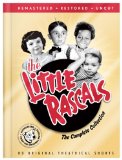| Reviews & Columns |
|
Reviews DVD TV on DVD Blu-ray 4K UHD International DVDs In Theaters Reviews by Studio Video Games Features Collector Series DVDs Easter Egg Database Interviews DVD Talk Radio Feature Articles Columns Anime Talk DVD Savant Horror DVDs The M.O.D. Squad Art House HD Talk Silent DVD
|
DVD Talk Forum |
|
|
| Resources |
|
DVD Price Search Customer Service #'s RCE Info Links |
|
Columns
|
|
|
Little Rascals: The Complete Collection, The
Kids being kids finally escape Bill Cosby's vault
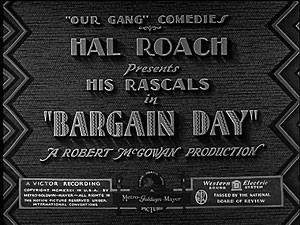 Reviewer's Bias*
Reviewer's Bias*
Loves: Good short films
Likes: "Little Rascals," Miss Crabtree, Spanky, Old slapstick
Dislikes: People who don't get the Cosby joke, Alfalfa
Hates: All the mean adults in the Rascals' world
The Movies
Why don't we see short films like the Our Gang movies anymore? Is the lure of television and its big syndication paydays too much for filmmakers to ignore? Realistically, many shows just don't have enough substance for a season's worth of episodes, Or perhaps The Little Rascals were just TV before TV knew what it wanted to be, bringing together familiar,likable characters again and again, just in new situations. Thus you can pluck any show here, the 80 talkies Hal Roach produced under the "Our Gang" banner, and it will feel like a comfy sweatshirt, warm and inviting, and delivering just the experience you expect.
When you mention "Our Gang," or the more commonly known title of "The Little Rascals" most people think of a select few cast members, like Alfalfa, Darla and Buckwheat, or memorable moments, like Alfalfawarbling the word "Figaro" and the formation of "The He-Man Women Haters Club." But they actually make up a relatively minor portion of the films' history, especially when you consider that Hal Roach's sound shorts were preceded by 88 silent films, and were followed by many more made without his input (though many fans of the series would prefer to forget them.) This set collects what are likely the most memorable of the franchise's 20-minute (and later 10-minute) films, as well as the most polished and completeefforts of the entire run.
Though the films utilized a stock group of child actors, there wasn't any noticeable continuity, as a kid could be a poor orphan in one film, a rich kid next time, and a working stiff in another. Basically, whatever the story required, is what the kids could be, though they are usually from the working class or below, free to roam the streets looking for fun or profit. What makes no sense though are the resources they have at hand, which are almost limitless, which the exception of propur spelin. At different times, the group has its own theater, with a working curtain, or a makeshift firetruck that they can ride through the streets. Perhaps it's just ingenuity, but these kids never seemed quite that industrious.
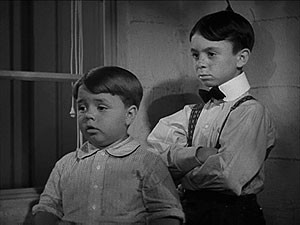 The show's strength is, at all times, the kids, whether it's disturbingly adult fat kid Chubbsy-Ubsy, naive Farina and little Wheezer, or more memorable later stars like Stymie and Butch. The child actors playing these kids frequently were either wooden or overacting, especially early on in the set, with some lines sounding like they were reading their lines for the first time, but when a kid hit, it felt incredibly natural. No one proved that more than Spanky, who was brilliant in just about every way, playing the de facto leader of the gang, despite being the smallest kid. His natural timing and reactions were perfect, allowing him to sell jokes that would leave other kids hanging in the wind. It's amazing to see someone so young with such a sense of comedy, and it makes perfect sense that the show would start to center around him. On the other end of the spectrum is the wholly unlikable Alfalfa, who almost became famous in spite of himself, as his lousy singing, odd look and annoying personality made him nearly into a villain.
The show's strength is, at all times, the kids, whether it's disturbingly adult fat kid Chubbsy-Ubsy, naive Farina and little Wheezer, or more memorable later stars like Stymie and Butch. The child actors playing these kids frequently were either wooden or overacting, especially early on in the set, with some lines sounding like they were reading their lines for the first time, but when a kid hit, it felt incredibly natural. No one proved that more than Spanky, who was brilliant in just about every way, playing the de facto leader of the gang, despite being the smallest kid. His natural timing and reactions were perfect, allowing him to sell jokes that would leave other kids hanging in the wind. It's amazing to see someone so young with such a sense of comedy, and it makes perfect sense that the show would start to center around him. On the other end of the spectrum is the wholly unlikable Alfalfa, who almost became famous in spite of himself, as his lousy singing, odd look and annoying personality made him nearly into a villain.
Though some point to the inevitable Spanky shows as one of the lower points of the series, where his frequently contentious home life was the focus of the film, it would be the repetition in the films that really became the bane of the franchise. Though these are hardly complex psychodramas, as they are loaded with vaudevillian comedy concepts and silly slapstick, they would often repeat themselves, including remakes of certain episodes, be it yet another attempt to pull one over on their teacher to get away and play hooky, or putting on a show that's plagued by a lack of talent and bad luck. Admittedly, it was fun to see these kids get their comeuppance as they try to pull a fast one, especially if the lovely Miss Crabtree (June Marlowe) is involved, but after two or three such attempts, you know what's going to happen.
For a series of films that are intended to be comedies, it's odd to see how dark the movies could be, with angry, bitter adults around many corners, including Spanky's parents, who seem near divorce and any number of foster parents who abuse their charges with impunity. Despite that, they were always trying to wring out a laugh, no matter what the target. As a result, the series is loaded with stereotypes and politically incorrect language and attitudes, which thankfully have been left intact. To hear a father casually refer to his child's friend as "the little pickaninny" or to see the kids turn to a Chinese child when they need to do laundry is indicative of the time during which the show was made, and shows the enlightenment that's occurred since, and should not be denied as part of our history, swept under the rug with a few easy edits. Here, all the "questionable" material that has previously been unavailable is back, making this a valuable historical document.
The thing that really stands out to someone watching these films with the distance of time and holding back any personal nostalgia for a youth loaded with such films, the advanced filmmaking that took place in these films is nothing short of outstanding. Whether it was Roach or director Robert McGowan's influence, these shorts tried things like split-screens and special effects on a regular basis, making them stand out for their innovations in a genre not particularly well-known for visual acrobatics. There are even limited attempts to integrate animation into the live-action films, used to add things like bubbles, when they wouldn't be practical to shoot for real. The animation isn't particularly good, but the attempt is admirable.
In this set, you get a lot of memorable films, but if you want the best, they are easy to pick out. Start with 1930's Teacher's Pet, which stars Marlowe as the kids' favorite teacher. There are a couple of plots at work, both of which are seen throughout the franchise. First, the kids want to play hooky, and recruit the younger kids to help get them out of school, a plan that will invariably fail thanks to their innocent truthfulness. The other is the old standby of the comic misunderstanding, as they think their teacher left, but she's only changing her name because she's getting married. It's a classic set-up, and one that Marlowe really sells as the children's bemused instructor. A quick flip to Disc Six will set you up with a run of prime Spanky-powered episodes, including Teacher's Pet remake Bored of Education, the very funny Divot Diggers and the previously edited Little Sinner and The Pinch Singer.
Here's the breakdown of what you get:
| DISC ONE Small Talk (1929) Railroadin' (1929) Boxing Gloves (1929) Lazy Days (1929) Bouncing Babies (1929) Moan and Groan Inc (1929) Shivering Shakespeare (1930) The First Seven Years (1930) When the Wind Blows (1930) Bear Shooters (1930) DISC TWO A Tough Winter (1930) Pups is Pups (1930) Teacher's Pet (1930) School's Out (1930) Helping Grandma (1931) Love Business (1931) Little Daddy (1931) Bargain Days (1931) Fly My Kite (1931) Big Ears (1931) DISC THREE Shiver My Timbers (1931) Dog is Dogs (1931) Readin' and Writin' (1932) Free Eats (1932) Spanky (1932) Choo Choo (1932) Pooch (1932) Hook and Ladder (1932) Free Wheeling (1932) Birthday Blues (1932) DISC FOUR A Lad an' a Lamp (1932) Fish Hooky (1933) Forgotten Babies (1933) Kid from Borneo (1933) Mush and Milk (1933) Bedtime Worries (1933) Wild Poses (1933) Hi, Neighbor (1934) For Pete's Sake (1934) The First Round-Up (1934) | DISC FIVE Honkey Donkey (1934) Mike Fright (1934) Washee Ironee (1934) Mama's Little Pirate (1934) Shrimps for a Day (1934) Anniversary Trouble (1935) Beginner's Luck (1935) Teacher's Beau (1935) Sprucin' Up (1935) Little Papa (1935) DISC SIX Little Sinner (1935) Our Gang Follies of 1936 (1935) Divot Diggers (1936) The Liucky Corner (1936) Pinch Singer (1936) Second Childhood (1936) Arbor Day (1936) Bored of Education (1936) Two Too Young (1936) Pay as You Exit (1936) Spooky Hooky (1936) Reunion in Rhythm (1937) Glove Taps (1937) DISC SEVEN Hearts are Thumps (1937) Three Smart Boys (1937) Rushin' Ballet (1937) Roamin' Holiday (1937) Night 'n' Gales (1937) Fishy Tales (1937) Framing Youth (1937) The Pigskin Palooka (1937) Mail and Female (1937) Our Gang Follies of 1938 (1937) Canned Fishing (1938) Bear Facts (1938) Three Men in a Tub (1938) Came the Brawn (1938) Feed 'em and Weep (1938) The Awful Tooth (1938) Hide and Shriek (1938) |
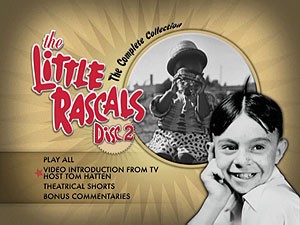 The DVDs
The DVDs
The 80 Our Gang shorts created between 1929 and 1938 are spread over seven DVDs, with an eight disc for extras. The discs, along with a 12-page booklet, are held in a four-tray digipak designed to look like a hard-cover book, with an embossed holofoil cover. The DVDs feature full-frame animated menus offer options to select shorts, play all films and watch any special features. There are no audio options, no subtitles and no closed captioning.
The Quality
Despite the claim that these full-frame black-and-white transfers are remastered and restored from original mastered, I didn't have a lot of hope that they would do an archival-quality job on 80 episodes, simply due to the scope of the effort. To my surprise, overall, the set looks very nice, as there are some fantastic looking films here, especially in the later discs, to go along with some less clear, yet still impressive efforts. Occasionally, there's some noticeable dirt and damage, especially on the oldest episodes, with big blotches or scratches in spots, but there are no issues with digital artifacts. The only other issue is with an inconsistent brightness that flickers throughout the films.
The Dolby Digital 2.0 presentation of the films' mono audio is good, but it also points out how bad the earlier audio recordings were, as you frequently can't even understand what is being said (making the absence of any subtitles or closed captioning more of a disappointment.) The later films are much improved, with clear, clean dialogue and strong special effects, as well as effective musical scores. Anyone singing can still be a bit distorted, but generally sounds good.
The Extras
There's a nice spread of extras included with this set, starting with the 12-page booklet tucked into the packaging. In addition to the usual list of films and extras, there's a short overview of the series, a piece on the curse of the Little Rascals, some pictures and trivia and a timeline of the franchise. It's a nice little bonus to go with the discs.
As far as on-disc content goes, we start with video introductions by either experts (Richard Bann and Richard Lewis Ward) or people connected with the show (syndication host Tom Hatten and actors Dickie Moore, Jerry Tucker, Annie Ross and Jean Darling.) They don't add a whole lot to the proceedings, with some minor notes and general good cheer, but it's a nice touch to have them involved.
Up next are three audio commentaries: author Bann on Teacher's Pet and Fly My Kite, and Ward on Wild Poses. Bann is an animated commentator, but too often he leaves dead air in the track, while Ward is much drier, but he has plenty of information to share about the film. Ward is back for more, providing insight on two of the three silent movies thrown in on the eighth disc, Dog Heaven and Spook Spoofing. Here, Ward succumbs to the silent treatment, but it's much more obvious when no one's saying anything in the film.Together with Barnum & Ringling, Inc., the third silent inclusion, these movies are excellent nods to the franchise's history, but unless you're a fan of quiet cinema, you'll find them to be a bit of a drag. The quality of the video doesn't match the look of the 80 films.
The rest of the extras take the form of a variety of featurettes (presented in anamorphic widescreen), starting with the 29-minute "The Story of Hal Roach and Our Gang." A history of the man behind the scenes, the kids on camera and the cultural icon he created, the piece is more or less hosted by Bann and Ward, as they talk about Roach's life and the development and impact of the series. It's a fine, concise look at a series, the casts and its creative force, and an entertaining look at a unique part of movie history, with one hell of a touching remembrance from Jean Darling.
"Rascals and Racial Issues" is a rather unflinching seven-minute look at the matter of racism and racial stereotypes in the "Our Gang" films, as the participants all can see the perceivable racism in the series, though they don't find it to have been actually racist, pointing out their own experiences on the show. The testimonials from Moore are particularly interesting to hear, when compared to later retroactive alterations to the films.
The final extra is the five-part "Catching Up with the Rascals," which features interviews with Moore, Darling, Tucker and Ross, as well as "Memories of Spanky," with his manager Rick Sapphire. In all, it runs nearly an hour, and is as simple as it is effective, as the former kids and Sapphire get free reign to talk about their lives and their experiences both as a Little Rascal and their post-film lives, which makes for some incredibly intimate moments. These are fascinating whether you give a damn about the films or not, as they are a great look at child celebrities and what that life is like. If only Spanky had been around to sit down for a chat.
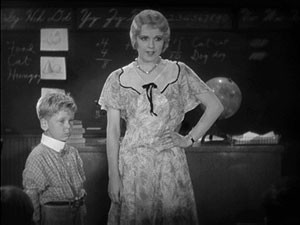 The Bottom Line
The Bottom Line
The comedy of "The Little Rascals" still holds up today, thanks to the universal premise of kids being kids, though whether the black-and-white films' dated situations sell to younger viewers without a sense of nostalgia will depend upon their viewing sophistication. The collection itself is an immense and impressive one, with a high level of quality and healthy serving of meaningful extras that any fan of classic comedy will want to watch.
Francis Rizzo III is a native Long Islander, where he works in academia. In his spare time, he enjoys watching hockey, writing and spending time with his wife, daughter and puppy.Follow him on Twitter
*The Reviewer's Bias section is an attempt to help readers use the review to its best effect. By knowing where the reviewer's biases lie on the film's subject matter, one can read the review with the right mindset.
|
| Popular Reviews |
| Sponsored Links |
|
|
| Sponsored Links |
|
|
| Release List | Reviews | Shop | Newsletter | Forum | DVD Giveaways | Blu-Ray | Advertise |
|
Copyright 2024 DVDTalk.com All Rights Reserved. Legal Info, Privacy Policy, Terms of Use,
Manage Preferences,
Your Privacy Choices | |||||||









